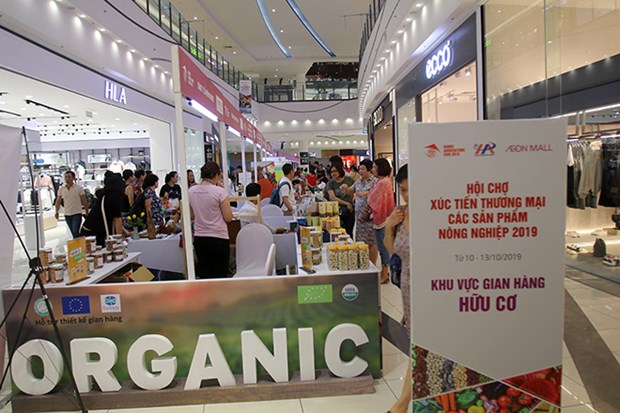Hanoi Agriculture Fair features OCOP products from 26 cities and provinces
An agricultural fair was kicked off by the Hanoi Promotion Agency (HPA) in the capital on November 6 to promote “One Commune, One Product” (OCOP) products from 26 cities and provinces nationwide.
 Booths showcasing organic products (Source: VNA)
Booths showcasing organic products (Source: VNA)Hanoi (VNA) - An agricultural fair was kicked off by the Hanoi Promotion Agency (HPA) in the capital on November 6 to promote “One Commune, One Product” (OCOP) products from 26 cities and provinces nationwide.
The Hanoi Agriculture Fair 2020 is being held at Aeon Mall Long Bien until November 9.
It features 100 booths showcasing thousands of organic and clean farm produce, hi-tech agriculture products, and local specialties with clear sources of origin.
The event is expected to not only promote OCOP products but also provide a platform for producers to seek partnerships and gain broader foreign market access through the Aeon retail network in Vietnam and all over the world, HPA Deputy Director Nguyen Thi Mai Anh said.
It also offers Vietnamese firms an opportunity to enhance their capacity and product quality and develop strategies for their products to better access the Japanese market.
Many OCOP products have been well-received by consumers, Anh said, adding that she hopes there will be more Vietnamese producers becoming trusted suppliers of the Aeon Group in the near future.
The fair will then take place in Aeon Mall Ha Dong from November 19 to 23.
Hanoi has selected several locations for the introduction and sale of goods under the OCOP programme, and is planning to increase the number of such showrooms in the time to come to make local goods more popular among domestic consumers and foreign visitors.
According to the city’s coordinating office for the new-style countryside building programme, Hanoi will boost local districts and towns’ implementation of the OCOP programme and will assess and seek the municipal People’s Committee’s recognition of more than 700 OCOP products rated at least three stars by the end of this year.
In 2019, 301 products from 18 district-level localities in Hanoi were given three stars or higher in the OCOP programme. They included six given five stars and proposed to be named national OCOP products, 207 given four stars, and 88 others given three stars.
Based on this, Hanoi is looking to assess and rate about 800 - 1,000 products this year, with at least 500 to reach the municipal level (three or four stars) and 100 the national level (five stars).
The city’s Department of Industry and Trade surveyed locations for showcasing and selling local OCOP products, such as shops at train stations, Noi Bai International Airport, bus terminals, rest areas along expressways and national highways, shopping malls, supermarkets, markets, tourist attractions, restaurants, hotels, traditional craft villages, and exhibition venues.
Deputy Director of the department, Tran Thi Phuong Lan, said five sites were selected: the store of the Vun Art Cooperative and the Trieu Van Mao silk shop in Van Phuc ward, the Xuan Cuong Handicraft store at the Ngo Thi Nham auction site, the safe vegetable store at Ha Dong Market, and the OCOP showroom at the department’s industrial development centre.
She noted that goods displayed are all rated at least three stars, like silk, vegetables, and handicrafts, which are recognised as typical rural industrial products at the municipal and regional levels.
Via these sites, outstanding rural industrial products from Hanoi will have access to more consumers, providing a basis for cooperatives, businesses, producers, and farmers to continue improving goods’ quality and design to meet consumers’ increasing demand, Lan said, adding that the Department of Industry and Trade will also work with other cities and provinces nationwide to showcase their OCOP products at those showrooms.
The local coordinating office for the new-style countryside building programme will provide more training to personnel in the OCOP programme and upgrade the origin tracing system for OCOP products, she added.
Hanoi is expected to open 25 showrooms of OCOP products this year and raise the total to 60-70 in 2021.
The OCOP was initiated by the Ministry of Agriculture and Rural Development in 2008, based on Japan’s “One Village, One Product” and Thailand’s “One Town, One Product” programmes. It is an economic development programme for rural areas and focuses on increasing internal power and values, and is also to help with the national target programme on new-style rural area building./.













